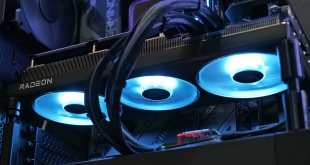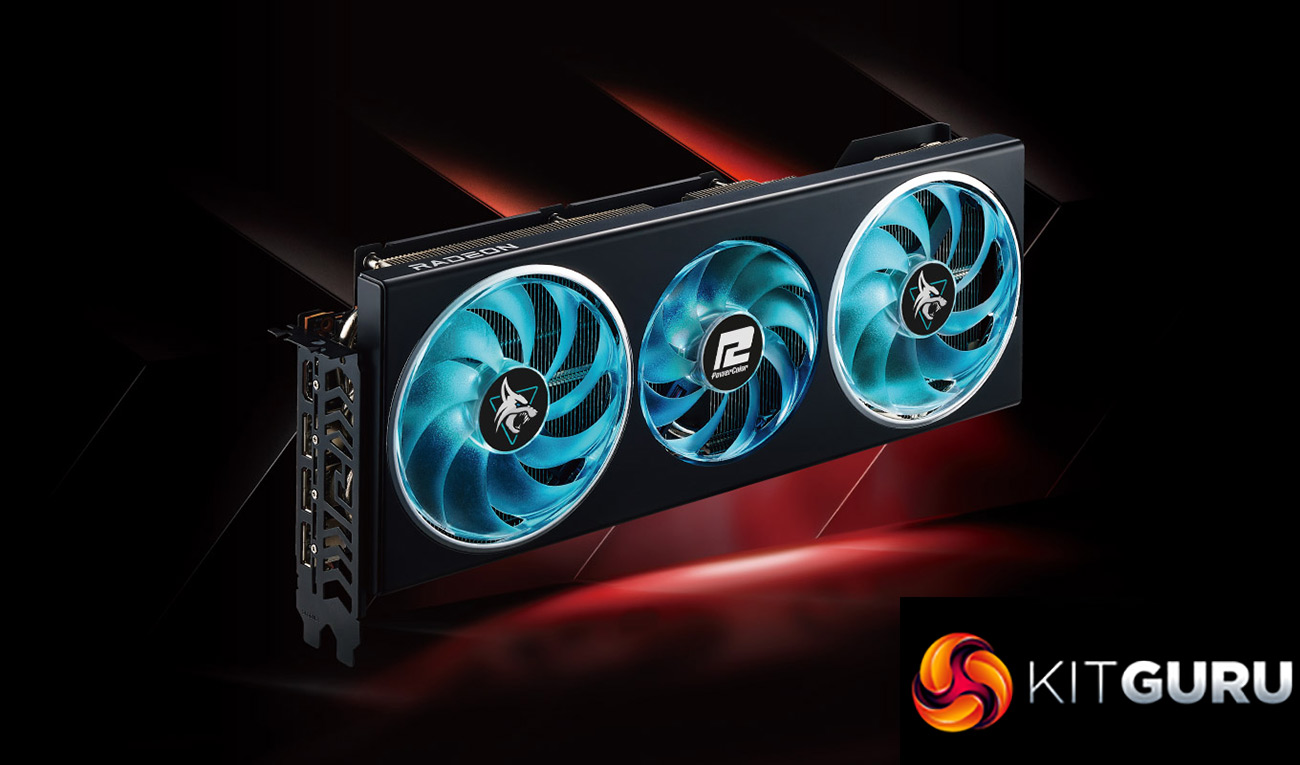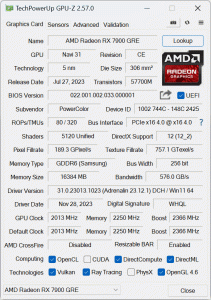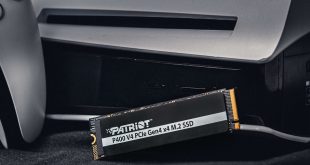
Today we are taking a look at a highly-requested graphics card – the PowerColor RX 7900 GRE Hellhound. It's been some time since we last looked at one of these GPUs, and with the Hellhound available at £549, it will be interesting to see how it stacks up not only against other 7900 GRE models, but also against Nvidia's RTX 4070 Super. We assess thermals, noise levels, gaming performance, power draw and more to find out if this card is worth buying.
| RX 7900 XTX | RX 7900 XT | RX 7900 GRE | RX 7800 XT | RX 7700 XT | |
| Architecture | RDNA 3 | RDNA 3 | RDNA 3 | RDNA 3 | RDNA 3 |
| Manufacturing Process | 5nm GCD + 6nm MCD | 5nm GCD + 6nm MCD | 5nm GCD + 6nm MCD | 5nm GCD + 6nm MCD | 5nm GCD + 6nm MCD |
| Transistor Count | 57.7 billion | 57.7 billion | 57.7 billion | 28.1 billion | 28.1 billion |
| Die Size | 300 mm² GCD
220 mm² MCD |
300 mm² GCD
220 mm² MCD |
300 mm² GCD
220 mm² MCD |
200 mm² GCD
150 mm² MCD |
200 mm² GCD
150 mm² MCD |
| Compute Units | 96 | 84 | 80 | 60 | 54 |
| Ray Accelerators | 96 | 84 | 80 | 60 | 54 |
| Stream Processors | 6144 | 5376 | 5120 | 3840 | 3456 |
| Game GPU Clock | Up to 2300MHz | Up to 2000 MHz | 1880 MHz | 2124 MHz | 2171 MHz |
| Boost GPU Clock | Up to 2500 MHz | Up to 2400 MHz | Up to 2245 MHz | Up to 2430 MHz | Up to 2544 MHz |
| ROPs | 192 | 192 | 192 | 96 | 96 |
| AMD Infinity Cache | 96MB | 80MB | 64MB | 64MB | 48MB |
| Memory | 24GB GDDR6 | 20GB GDDR6 | 16GB GDDR6 | 16GB GDDR6 | 12GB GDDR6 |
| Memory Data Rate | 20 Gbps | 20 Gbps | 18 Gbps | 19.5 Gbps | 18 Gbps |
| Memory Bandwidth | 960 GB/s | 800 GB/s | 576 GB/s | 624 GB/s | 432 GB/s |
| Memory Interface | 384-bit | 320-bit | 256-bit | 256-bit | 192-bit |
| Board Power | 355W | 315W | 260 W | 263W | 245W |
First, let's take a quick look at the specs. The RX 7900 GRE is using the same Navi 31 die that we first saw with the RX 7900 XTX and 7900 XT, but it has been significantly cut-down. Still, using the same die means we find a 300mm² Graphics Compute Die, based on TSMC's 5nm node, flanked by six 37mm² Memory Cache Dies (though two are disabled for the 7900 GRE). In total, the Navi 31 GPU packs 57.7 billion transistors.
While a full Navi 31 GPU packs in 96 Compute Units, the 7900 GRE is cut down to 80 CUs, 4 fewer than the 7900 XT, and each CU houses 64 Steam Processors, for a total of 5120 shaders. There's also 80 Ray Accelerators – one per CU – and 192 ROPs.
As for clock speed, AMD has de-coupled the clocks, so the front-end and shaders can operate at different clock speeds in a bid to save power. With the RX 7900 GRE, the Hellhound does come factory overclocked, with a boost at 2366MHz when using the OC BIOS.
The memory configuration is where we see the biggest change compared to the 7900 XT, however. With two of the six MCDs disabled, the RX 7900 GRE packs 16GB of GDDR6 memory clocked at 18Gbps, operating over a 256-bit memory interface, for total memory bandwidth of 576 GB/s. 64MB of Infinity Cache is also present, which allows AMD to claim an ‘effective memory bandwidth' of up to 2265.6 GB/s.
Power draw for the RX 7900 GRE is also rated at 260W Total Board Power (TBP), but the Hellhound has increased this up to 280W.
 KitGuru KitGuru.net – Tech News | Hardware News | Hardware Reviews | IOS | Mobile | Gaming | Graphics Cards
KitGuru KitGuru.net – Tech News | Hardware News | Hardware Reviews | IOS | Mobile | Gaming | Graphics Cards




